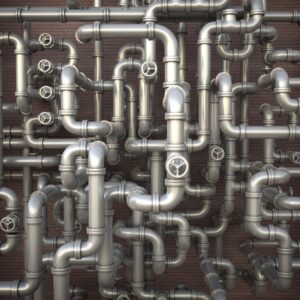Althoff Industries has served the commercial plumbing needs of Chicagoland since 1960. That means we have many decades of experience ensuring that businesses meet and exceed local, state, and federal plumbing codes. If you try to navigate these regulations on your own, you’ll quickly find them overwhelming.
To help you understand the importance of working with a licensed commercial plumber, we’re going to break down several of the codes and regulations that need to be kept in mind during any commercial plumbing service.
1. Uniform Plumbing Code (UPC) and International Plumbing Code (IPC)
Most plumbing regulations in the United States are based on one of these two major plumbing codes. The UPC is more common in the Western US States, while the IPC is primarily adopted in the Eastern US. The Chicago Plumbing Code is based on the Uniform Plumbing Code (UPC), although it also includes additional requirements specific to Chicago.
2. Americans With Disabilities Act (ADA) Requirements
Commercial facilities must adhere to ADA standards, which ensure accessibility for people with disabilities. These regulations affect the height and space around fixtures, such as toilets and sinks, to guarantee that they are accessible to all users. Failure to comply with ADA standards can result in expensive fines and retrofitting.
3. Water Efficiency Standards
Both federal and state laws may dictate water efficiency standards. This includes requirements for low-flow toilets and urinals, faucet flow rates, and other fixtures that conserve water. Meeting these standards not only helps the environment but can also reduce water bills significantly.
4. Health and Safety Codes
Health and safety codes are especially stringent for facilities that handle food or medical services. These codes ensure that plumbing systems do not cross-contaminate water supply and waste lines and create health hazards. Regular inspections and compliance with these codes are essential to maintain a safe facility for both employees and the public.
5. Backflow Prevention
Backflow prevention devices are mandatory installations in commercial plumbing systems to prevent wastewater from flowing the wrong direction into the freshwater supply. (This can occur because of pressure changes.) Compliance with backflow prevention regulations involves regular testing and certification of backflow prevention devices to make sure they function correctly and protect the public health.
6. Local Building Codes
Each municipality may have additional local building codes that affect plumbing. These can include specific requirements for pipe materials, joint types, and even the qualifications of the plumbers who do installations or repairs. These requirements are especially important during a renovation or construction project.
Failure to comply with plumbing codes can result in penalties, work stoppages, or severe health risks. Moreover, when you understand and adhere to these regulations, you can significantly enhance the efficiency and longevity of your plumbing systems, saving money and trouble over time.
At Althoff Industries, we specialize in ensuring that your facility’s plumbing system is not only compliant but optimized for your specific needs. Whether you are constructing a new building, renovating an existing one, or simply need to ensure your systems are up to date, make us your first choice for a commercial plumbing contractor in St. Charles. We pride ourselves on staying ahead of the curve with the latest technologies and regulations.
Contact Althoff Industries, Inc. to work with an experienced Chicagoland commercial plumbing contractor. Challenges Accepted!

